How to Choose the Right Construction Company for Your Home
Building your dream home is one of the biggest investments in life — both emotionally and financially.
While design and materials are important, the most critical decision is choosing the right construction company to bring your vision to life.
The right builder ensures quality, transparency, and on-time delivery, while the wrong one can turn your dream into a stressful experience.
This guide will help you understand how to choose a reliable construction company, what to check before signing, and how to avoid common traps.
1. Understand the Types of Builders
Before shortlisting, it’s important to know the different types of construction providers:
Local Contractors: Usually handle small to medium projects with limited resources.
Professional Construction Firms: Have in-house engineers, project managers, and standardized processes.
Design-Build Firms: Offer end-to-end service — from architectural design to final handover.
Tip: For a residential house, choosing a professional firm or design-build company provides better accountability and quality control.
2. Check the Company’s Experience and Track Record
A firm’s past work is the best indicator of its quality.
What to do:
Visit their completed and ongoing sites.
Ask for before-after photos or videos.
Look for projects similar to your budget and style.
Why it matters:
Experienced firms understand local soil, climatic conditions, approval processes, and labour management — leading to smoother execution.
3. Verify Legal Registration and Certifications
Before trusting any company with your money, check:
GST registration
Company registration (CIN or firm number)
RERA registration (if applicable)
Business address and tax details
This ensures authenticity and accountability. Avoid builders who work without a registered business name.
4. Review the Construction Agreement Thoroughly
A written construction agreement protects both you and the builder. It should clearly mention:
Total construction cost and inclusions
Payment schedule linked to project stages
Timeline and penalty clause for delays
Material brands and quality standards
Warranty and maintenance clauses
Tip: Never rely on verbal promises — get every detail in writing.
5. Compare Quotes the Right Way
When collecting quotations, don’t just look at the lowest price.
Instead, check:
Whether it includes approvals, soil testing, and interior finishing
Brand names of materials (cement, steel, tiles)
Site supervision charges
Hidden costs like electricity, water connection, or elevation work
A quote that’s too low may mean compromises in material or quality.
6. Visit Their Current Projects
Nothing builds confidence like seeing the work in progress.
When visiting a site:
Observe site cleanliness and safety practices
Talk to workers about material quality and payment punctuality
Check for curing, waterproofing, and alignment precision
Professional firms maintain organized sites and follow standard engineering practices.
7. Evaluate Technical Capability and Manpower
Ask whether the company has:
In-house civil engineers and architects
Dedicated site supervisors
Quality control checklist for each stage
Builders who depend entirely on subcontractors often lack accountability.
Choose a firm that has its own technical team for full control over the process.
8. Communication and Transparency
Good builders maintain regular communication with clients.
Check if the company provides:
Weekly progress updates (photos/videos)
Transparent billing
Dedicated point of contact
Open communication builds trust and reduces misunderstandings.
9. Read Reviews and Ask for References
Online reviews can give you a general idea, but personal references are better.
Ask the builder for:
Contact details of 2–3 past clients
Feedback on delivery time, material quality, and after-support
Be cautious of only “perfect” reviews — genuine firms have balanced feedback.
10. Quality Standards and Material Assurance
Quality materials ensure long-term durability.
Ask the builder about:
Cement brand (Ultratech, Ramco, etc.)
Steel grade and source
Waterproofing method
Brick or block type (Fly ash, AAC, etc.)
Reliable companies maintain quality documentation and purchase from authorized dealers.
11. Transparency in Payment and Schedule
A trustworthy company follows a stage-wise payment schedule,
for example:
Foundation completed → 15%
Roof level → 25%
Plastering → 25%
Finishing → 20%
Final handover → 15%
Never pay a large advance upfront.
Linking payments to progress ensures control and accountability.
12.Red Flags to Avoid
No written agreement
Unrealistically low quotation
No previous projects or references
Refusal to show licenses or registration
Over-promising timelines (e.g., “4 months for full house”)
If you spot these, walk away immediately.
13. Bonus: Questions to Ask Before Finalizing
How long will the project take?
Who will supervise the site daily?
Which brands of materials are included?
How will you handle delays or material shortages?
Do you provide post-construction maintenance or warranty?
Asking these builds trust and clarity.
14. Why Choose a Professional Construction Firm
- One-point responsibility for design, materials, and execution
- Clear cost estimate — no hidden surprises
- Timely project completion
- Professional engineers and standard procedures
- Warranty and maintenance support
Professional firms not only build homes but relationships.
Conclusion
Choosing the right construction company is not just about comparing costs — it’s about ensuring peace of mind, safety, and long-term value.
Take time to research, verify, and communicate clearly.
A transparent, experienced, and professional builder will not only construct your house but also build your trust.
